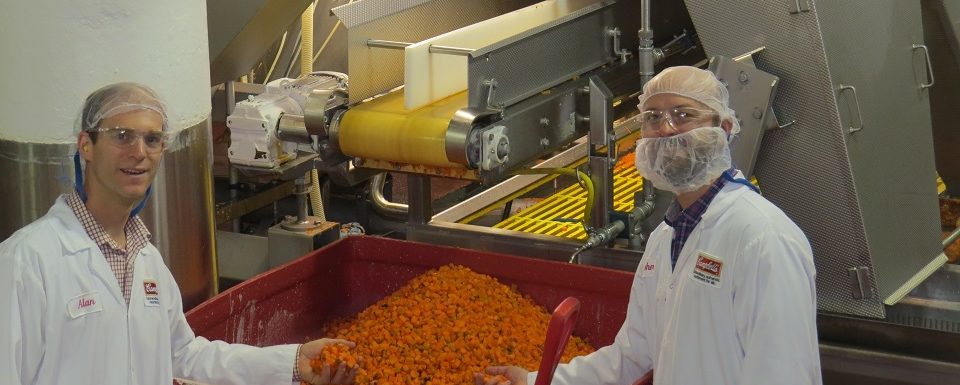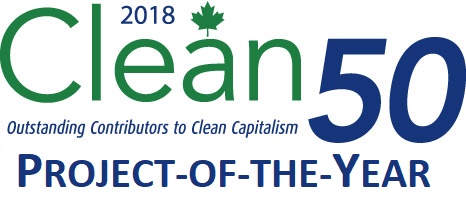Campbell Company of Canada, Enviro-Stewards & Provision Coalition – Food Loss + Waste Reduction Pilot

Projects Sponsor
 Approximately forty percent of the food we produce in Canada is wasted; 18% of this is lost in manufacturing. Food loss + waste is a $6 billion opportunity for Canada’s food and beverage manufacturing sector. The ability of facilities to measure the extent and nature of Food loss + waste in order to find preventative solutions is key to solving the problem.
Approximately forty percent of the food we produce in Canada is wasted; 18% of this is lost in manufacturing. Food loss + waste is a $6 billion opportunity for Canada’s food and beverage manufacturing sector. The ability of facilities to measure the extent and nature of Food loss + waste in order to find preventative solutions is key to solving the problem.
Campbell Canada’s believes that food loss + waste (FLW) prevention is aligned with their mission “to provide real food that matters for life’s moments.” Campbell was already diverting 99% of its organics for reuse by a biogas generation facility.
With this in mind, Campbell collaborated in a pilot to apply Provision’s FLW Reduction Toolkit (launched Oct 2016) and conduct a FLW Prevention Assessment with Enviro-Stewards with the goal of preventing food waste at the source. The Toolkit assisted with quantifying in-plant avoidable FLW, calculating its dollar value, and conducting a root-cause-analysis to develop cost effective prevention strategies and solutions.
The concurrent FLW Assessment used a systematic approach to identify practical opportunities to reduce the proportion of food wasted in the first place (i.e. minus $80/tonne if diverted versus plus $2,000/tonne if sold as food).
The purpose of the pilot was to demonstrate to Canada’s food and beverage (F&B) industry the business benefits resulting from the application of FLW prevention solutions (and toolkit) using Campbell as a case example. The pilot identified practical and economically attractive opportunities to reduce food waste by almost 1,000 tonnes/year valued at $706,000.
Toolkit development required rigorous research and a review of industry beneficial practices. Provision worked with Enviro-Stewards, 2cg, and Dillon Consulting to develop the content that was then developed into a web-based tool housed in Provision’s Online Sustainability Management System (SMS) [recognized as Top 3 Projects by Clean50 2017].
Throughout the research and development, Provision solicited feedback from its Manufacturer Working Group and Stakeholders Collaborative (including Campbell) to ensure the toolkit was practical and addressed industry needs.
Campbell partnered with Provision and Enviro-Stewards to be the first company to test and pilot the new online FLW toolkit custom built for Canada’s 6,000 plus manufacturers. Toolkit was officially launched on October 25, 2016.
The pilot engaged Enviro-Stewards’ root cause resource conservation approach. Campbell staff participated in the kick-off meeting, walk-thru, training and progress meetings.
An evaluation of the entire processing facility from raw vegetable receiving to final product packaging and canning was conducted. Enviro-Stewards collected a series of samples to quantify FLW generation rates and their associated embedded values at each step of the production process.
Once logging equipment was retrieved and samples were analyzed, the data was compiled and entered in the FLW toolkit. The Toolkit further analyzed the data to quantify major waste generating processes which could be influenced through changes and efficiencies.
Next, root causes of each waste stream were then identified. These root causes were then analysed for each of the major resource consuming processes and alternative solutions with substantially less resources were developed.
Possible conservation solutions and opportunities for reducing food waste streams were evaluated by the multidisciplinary team for implementation. An implementation plan with capital & operating cost estimates, payback analysis and business cases was prepared by Enviro-Stewards.
In all, the pilot identified six FLW reduction opportunities to avoid food waste and increase the yield by 938 tonnes/yr with a product value of $706,000, with a payback of less than six months.
Building upon Campbell’s success with the pilot, Provision applied the lessons learned to test the toolkit with: Marsan Foods, Saputo Inc., Ippolito Inc., EarthFresh Foods Inc. and Byblos Bakery and Calgary Italian Bakery Ltd. (CIBL) in Alberta.
If a leading processor such as Campbell can find practical and lucrative conservation opportunities, other manufacturers can be inspired to follow suite and lessons learned from the pilot will be applied in the next iteration of the Toolkit. One of which is to include energy, water, carbon and labour calculations to correlate resource conservation and emissions reductions with FLW prevention.
















